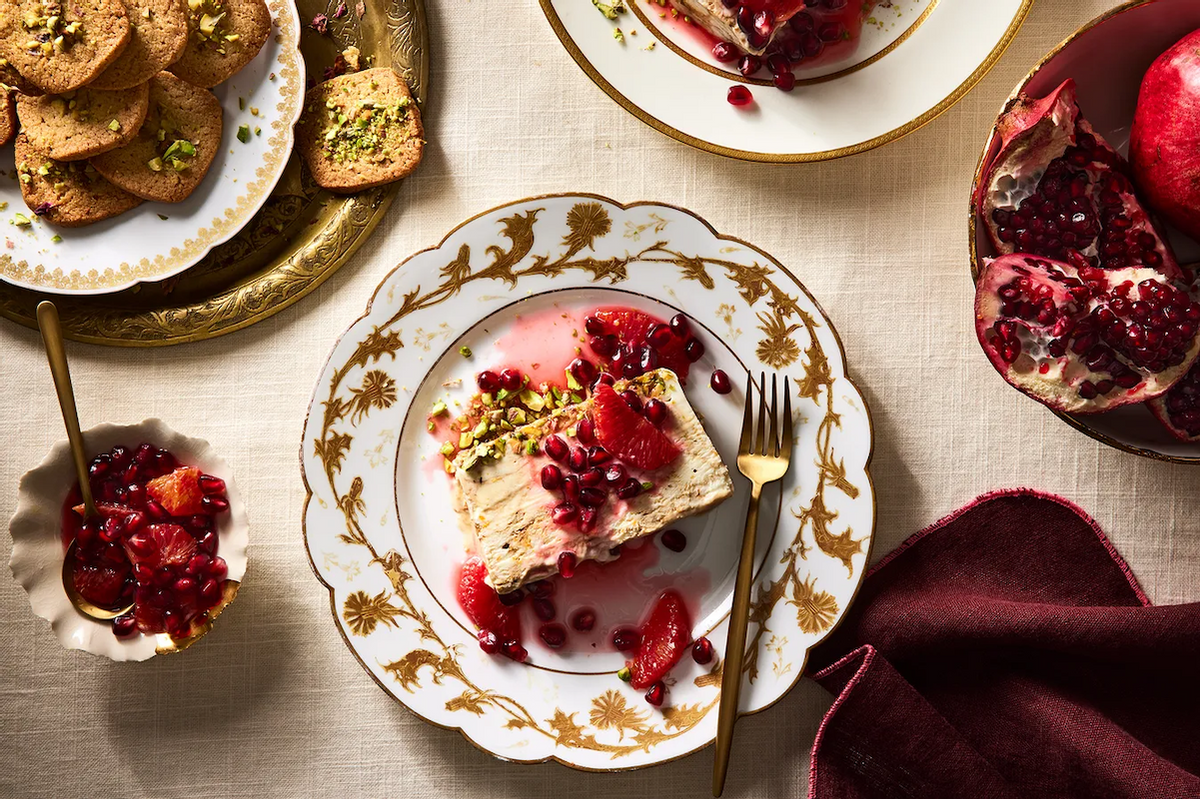If you can remember the last time you stayed up with family or close friends past midnight, talking, laughing, dancing, snacking, and drinking, then you have a feel for Shab-e Yalda, the Iranian celebration of the winter solstice on Dec. 21.
Shab-e Yalda translates roughly to "night of birth" in the ancient language of Syriac, referencing the sun being reborn and light prevailing over darkness. It's a powerful time, and there is magic in the air as people reenact the same ritual as their ancestors have for literally thousands of years. "It's my favorite night of the year," gushed my cousin Setareh, who grew up in Iran and now lives in San Diego. "The idea that there is one extra minute in this night and that we should spend it with the people we love is so romantic."
The Shab-e Yalda celebration begins after dinner, and can last until dawn. There is music, dancing, and Iran's beloved literary art form, poetry. The decor is all red and fire. To get a feeling for how modern-day Iranians celebrate, just search the hashtag "Yaldanight" on Instagram and you'll get an eyeful of scarlet-clad people posing in candlelit tableaux, watermelon-painted fingernails, and small children holding pomegranates.
At Yalda, fruit has a special status as the embodiment of summer, conjuring the juicy flavors of hot days. Traditionally, the host lays a table, called a sofreh in Farsi, with a platter of pink slices of watermelon, the essential Iranian summer fruit. Another cousin, Shirin, who lives in Orange County, California, explained how as a kid growing up in Iran, it was fun to go to the bazaar and hunt for watermelon. "Here in California we always have summer food, but in Iran, food is truly seasonal. Shopkeepers will save watermelons especially for Yalda. I remember it felt like a victory when you found one," she said, laughing.
Pomegranates, the most iconic and beloved fruit in Iran, also have a place on the Yalda table. I like to make this pomegranate semifreddo for Yalda because it's so festive. With its green coat of crushed pistachios and splash of ruby seeds, it looks like the enchanted food you might find in a fairy tale, which is fitting for a magical night like Yalda. Pomegranates and pistachios are two of Iran's most storied foods, going back thousands of years. There is something about eating the same foods that your ancestors did on the same night going back countless generations that plants you firmly on a continuum with the past.
In her classic cookbook The Legendary Cuisine of Persia, author Margaret Shaida translates the term shab-chera, the ceremony of staying up all night on Yalda, as "night-grazing," one of my favorite Iranian expressions. Indeed, there are plenty of snacks on the Yalda table for guests to munch on through the night. These include bite-size chickpea flour and cardamom nokhodchi cookies, raisin and saffron keshmeshi cookies, and the chewy pistachio nougat candy called gaz. There is also ajeel, a distinctly Persian mix of nuts and dried fruits that includes pistachios, dried chickpeas, watermelon or pumpkin seeds, figs, and apricots. To drink, there is red wine, and endless hot black tea (Iran's national drink) ready in the samovar on the stovetop.
I didn't grow up observing Yalda, and celebrating it on my own at first felt like attempting to speak an unfamiliar language by reading it off a page. But since traveling to Iran a few years ago, I understand it much better. In Iranian culture, family is the point; there's nowhere better to be or people more exciting to be with. One weekend, I drove with my cousins to their cabin north of Tehran. We spent the days strolling the countryside, grilling kabobs, eating, and talking late into the night about family history and a million other things. I have a picture of us all squished in the car on our way back to the city, and it brings me back to how deeply connected and whole I felt after spending time with them. Yalda is just a great excuse to do what Iranians love best: hang out with family.
The pull of Yalda is strong, and for Iranian immigrants, it's a vital connection to the old world. This is perhaps most evident in the practice known as fal-e Hafez, an essential element of Yalda night. Here, a friend or family member opens a book of poems by the 13th-century Iranian poet Hafez to a random page, and the last verse of the poem is your destiny — at least for the coming year. "My best friend back in Iran, she always did it for me," Setareh tells me. But even though they are now worlds apart, they still read each other's fortunes on Yalda night. "She sends me a photo of the page that she picks for me. I'm still attached to my friends and family and culture."
The family members who spoke with me about Yalda emphasized how we need to take any opportunity we can these days to celebrate and be lighthearted. So this Yalda, gather up friends and the best winter fruits you can find to create your own fiery festivities. You'll likely be carrying on a family tradition, because wherever your ancestors are from, if you go back far enough, they, too, likely called on the sun in the dead of winter to dispel the darkness with some warmth and joy.




Shares